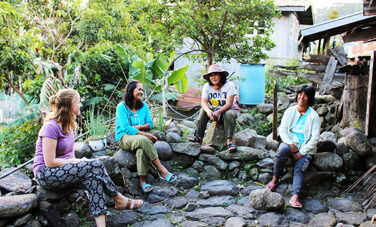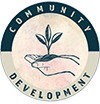ABM Archive Website
THIS WEBSITE CONTAINS ARCHIVE MATERIALS FOR HISTORICAL REFERENCE ONLY
For up-to-date information, including our latest appeals, news, and resources, please visit our current website.
Philippines: Asset Based Community Development
 |
|
Kate Winney (left) talking with group members who participate in the |
 |
This is part of the Community Development Program: Learn more about ABM’s Programs
This project seeks to enable rural
communities to escape the cycle of poverty, using their own resources and assets to facilitate their own development. Thanks to past supporters ABM has been able to work in partnership with its two Philippines partners, Episcopal
Community Action for Renewal and Empowerment (E-CARE) and Visayas and Mindanao Regional Office for Development (VIMROD), and many community groups to build business and development opportunities.
In 2017, ABM staff member, Kate Winney, visited Benguet and Mountain Provinces in the north of the Philippines, and talked with community members about the changes in their families and communities after receiving training and livelihood support from E-CARE as part of this project. Many spoke of the new sense of unity within the community through coming together and identifying assets and strengths, with one member noting that the process is “not just informative, but transformative.” People spoke of being able to reclaim their land, new skills in accounting, being able to eat their produce, increased production and increased incomes resulting in further education for their children.
One of these, Evangelita, said: “I have two children aged two and five, and joined the Pegueyna Family Farmers Association which is supported by E-CARE eighteen months ago. The livelihood support provided additional funding to my personal capital, and was used for growing potatoes, broccoli, carrots and leeks. This feeds my family and is also sold at the market, increasing my income and sustaining family needs –particularly in health and day-care. We harvest every 3-4 months and Asset Based Community Development I have learned to budget so that the income sustains us until the next harvest. My relationships with my neighbours were not good because of circumstances in the past, but they become successful through the Association. We have learned to understand each other and put down our pride, so that our community will grow and succeed. By God’s grace I am very happy and thankful.”
On the Visayan island of Santa Fe, VIMROD has been supporting several community organisations
through seed funding and training, using the asset-based approach. One of these is the Balidbid United Farmers and Fisherfolks Association. The group’s president, Liezel Pacinio, told ABM that they are in the process of registering the organisation with the Philippines Department of Labor. Registration will allow them to avail themselves of government services and eventually venture into other income-generating
projects.
The Association’s main livelihood activity at the moment is hograising, which was decided on during a process of discussing what assets the group members already had. Since the majority of members are women, they felt hog-raising would be something they could do at home while caring for their children. Funds for the hog-raising are released by the Association to individuals once they have prepared the pig pens and are fully ready to start raising the animals. The group also plans to produce organic feed for the hogs. Again, this reflects the asset-based approach, since the community is blessed with a great
deal of vegetation which can be used as animal feed. The training they received from VIMROD has made them realise the value of organic feed over commercial feeds which may not produce such
healthy pigs.
Your donation to this project will empower women and transform the lives of families in rural
communities in the Philippines, both economically and socially.
PH001EE needs $31,869 in 2018 (tax-deductible)
| This project receives partial funding from the Australian Government. |
HOW TO DONATE
You can make an online donation to this project. ![]()
Alternatively, for donations by cheque/money order (made out to the Anglican Board of Mission – Australia), telephone or email, view contact details here. Please don’t forget to include the project name and/or code with your payment details.
Gifts to ABM will be applied to the support of project(s) selected. In the unlikely event of the project being oversubscribed or not proceeding to completion, donations will be applied to a similar project to the one(s) selected.
Project Update
November 2017 – The Bauyan rice planters have experienced a remarkable transformation, thanks to the work of IFI VIMROD through the Economic Empowerment project. Read more.
April 2017 – Last month, ABM Pacific Programs Officer Kate Winney had the opportunity to travel to the Philippines with ABM Education Officer Sarah Gover, to learn about E-CARE’s approach to community development. Read more.
February 2017 – The Dagadag Farmers Association, as it is known today, was formed and organized when some of the struggling farmers learned about what the E-CARE Foundation was doing in a community nearby. Due to their earnest desire to improve their economic situation for their families and community, E-CARE agreed to begin a similar Asset-based Community Development project in Dagadag. Read more.
This video tells the story of the Kasalika Association in Manila, Philippines. Kasalika means ‘you belong’. It is the group that sews ABM bags for Synod packs in Australia.
The video was filmed and produced by Farida Pasiwen-Cawatig who is the Program Assistant on Research and Documentation for the Community Based Development Program of the Episcopal Church in the Philippines.
< Back


